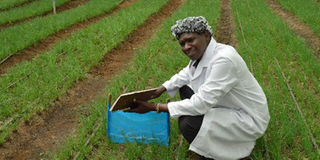Beautiful basil and rosemary spice our pockets

Maina Mutheki and farmers working in the chives greenhouses in Nakuru. PHOTO | CAROLINE WAMBUI | NATION MEDIA GROUP
What you need to know:
- Gabriel Keya, a director at Jambo Fresh, an export company that runs the farm, notes that some herbs do well outdoor but some like basil cannot survive in the open fields.
- He says they grow the herbs under strict supervision because they do not want anything to go wrong and, thus, spoil the market.
- Thyme is used as an anti-fungal, a cough remedy, a natural deodorant and is known to contain Vitamins C, A and B6 and calcium, among others.
- Rosemary, on the other hand, is a rich source of anti-oxidants that help boost the immune system, improve blood circulation, enhance memory and concentration, contains iron, potassium and Vitamins A and C.
- Chive is mainly used in soups, salads while rosemary with nyama choma locally.
- The farm harvests only on order using secateurs
Some few kilometres from the magical Lake Nakuru, the home of flamingoes, sits Fundisho Farm.
One can denote that Fundisho, as the name suggests, is a place full of lessons.
The three-acre-farm is home to different herbs and spices that include chive, basil, rosemary, mint and thyme.
While Fundisho grows chive and basil in 15 greenhouses, the rest are farmed in the open field.
Gabriel Keya, a director at Jambo Fresh, an export company that runs the farm, notes that some herbs do well outdoor but some like basil cannot survive in the open fields.
“Basil needs shade and heat for it to thrive, again, it cannot survive the chilly night condition.”
High medicinal and nutritional value.
He says they grow the herbs under strict supervision because they do not want anything to go wrong and, thus, spoil the market.
“The crops have high returns as compared to conventional vegetables,” says Keya, adding that they are also high in medicinal and nutritional value.
Thyme, for instance, is used as an anti-fungal, a cough remedy, a natural deodorant and is known to contain Vitamins C, A and B6 and calcium, among others.
Rosemary, on the other hand, is a rich source of anti-oxidants that help boost the immune system, improve blood circulation, enhance memory and concentration, contains iron, potassium and Vitamins A and C.
Similarly, chive helps in sleep and muscle movement and in curbing depression and is known to have Vitamins A and C, magnesium, phosphorous and potassium.
Not to be left behind is mint, which is used to treat common cold and helps in curing sore throat, offers a fresh breath and contains Vitamins A and C, iron, calcium and proteins.
“These key minerals make the herbs highly marketable particularly in the export market. Unfortunately, the values of these herbs are not known much locally,” says Keya.
Herbs need well-drained soils
To plant the herbs, explains Keya, seeds are first grown in the seedbed, taking four to six weeks before they are transplanted to the open field or greenhouse.
“The crops need sufficient water until the third week, for us we use the drip irrigation system. After the third week, we minimise watering.”
James Mwangi, an agronomist with Anek Enterprises, explains that the herbs need well-drained soils that range from neutral to alkaline.
“The herbs have a low maintenance cost because they are resistant to pests and diseases and the farmer is assured of market both oversees and locally.”
Cyrus Mutuma, an agronomist with Jambo Fresh, says most herbs require a pH of 5.5 to 7.5. The soil type doesn’t matter much, but it should be loamy or black cotton.
“Most of the herbs, in particular, rosemary are naturally repellent to pests and diseases. However, thrips and downy mildew affect both chives and basil, which we use pesticides to eliminate,” says Mutuma, adding that hygiene is key, with drip irrigation the most suitable form of watering.
Delicate harvesting process
On average, they take two to three months to mature, but for some, a proper first yield is realised after six months when the crop is fully established after which harvesting can be done for the next 10 years.
The farm harvests only on order using secateurs. “We do this very early in the morning when the crop is fresh and moist to avoid wilting and to maintain freshness. We cut the sprigs according to the client’s size and specifications and pack them immediately, put in refrigerated trucks and transport to the airport for export to Netherlands, Dubai and Britain.”
They offer 400kg per every quarter acre for all the crops except basil that offers 500kg per acre, with an average market prices of Sh120 a kilo.
Chive is mainly used in soups, salads while rosemary with nyama choma locally. The herbs are also used in tea, in making fresh juices as they contain essential oils where their leaves are crushed and mixed with beetroot.
The farm does not sell their produce locally as the market doesn’t purchase in large quantities.
Getting everything right
Fundisho project manager Maina Mutheki says in contract farming as theirs, one has to get everything right, from the seeds to the agronomist for quality produce.
“Also ensure you have a good storage facility to maintain freshness from the farm to the market,” he says, adding the herbs can be grown in different parts of the country but one must invest in soil analysis and market research.
Besides a cold room, contract farmers also need a good chemical store, a hand washing unit and a footbath to meet global gap certification. One must further ensure there is good supply of water and the soil is free of any infections.
“For greenhouses, we prefer ones whose frame is made from metal because the wooden one’s normally rot allowing water to drip in bringing diseases,” says Keya.
Farming the crops comes with minimal losses since they can either be sold fresh or dried and grounded.





